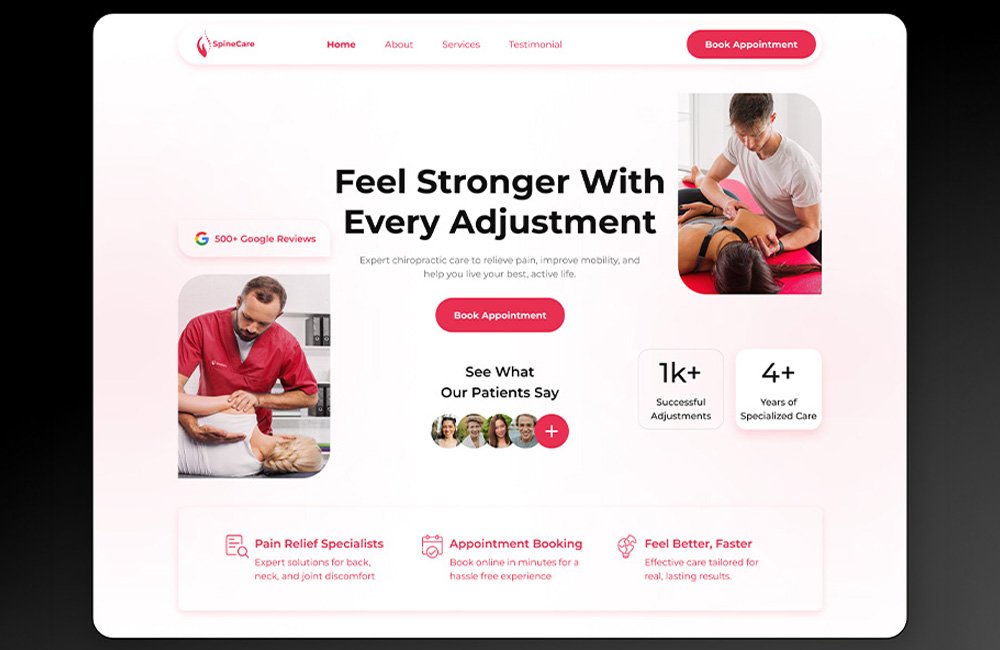Is your psychologist website reflecting the trust and professionalism you offer your clients? If not, it might be time to update your website. A trustworthy and professional website is crucial in building credibility, making it easier for potential clients to choose you for their mental health needs.
Here’s how you can build a website that helps you stand out and gain the trust of your clients.
1. Clean and Professional Design
Your website design is the first thing clients will notice. A cluttered, outdated design can make your practice seem unprofessional and untrustworthy. A clean, modern design helps convey that you care about quality and professionalism, making clients feel more comfortable reaching out.
What to do:
- Use a simple, elegant layout that highlights the important sections.
- Ensure your website is easy to navigate with clear headings and sections.
- Choose colors that evoke calm and trust, such as blues and greens.
2. Showcase Your Services Clearly
Your potential clients need to know what services you offer. A well-organized, easy-to-find services page is key in providing clarity. Whether it’s therapy sessions, couples counseling, or group therapy, clients want to quickly understand how you can help them.
What to do:
- Create separate pages for each service you offer, with detailed descriptions.
- Include information about your approach and any specialties you may have.
- Add testimonials or case studies (with permission) to highlight your success.
For tips on organizing your service pages effectively, check out our blog on Organizing Your Website for Better User Experience.
3. Add Client Testimonials and Reviews
Nothing builds trust like positive feedback from real clients. Testimonials and reviews can help build trust and showcase your success in helping others. Including these on your website can make new clients feel more confident in their decision to reach out to you.
What to do:
- Dedicate a page or section for client testimonials.
- Include reviews from satisfied clients (with their consent) to show your impact.
- Make sure the testimonials reflect a variety of services you offer.
To learn more about using testimonials effectively, read our blog on How Client Testimonials Can Improve Your Practice.
4. Secure and Easy-to-Use Contact Forms
Privacy and security are crucial when it comes to mental health. Your website should have a secure, easy-to-use contact form that allows clients to reach out without any worries about their personal information being compromised.
What to do:
- Use an encrypted contact form to ensure client data is protected.
- Keep the form simple, asking only for necessary information, like name, email, and a brief message.
- Offer multiple ways to contact you, including phone, email, and an online chat option if applicable.
5. Include Your Professional Credentials
Potential clients will want to know that you are qualified and capable of providing the help they need. Displaying your professional credentials and qualifications prominently on your website can help build credibility and reassure visitors that they are in good hands.
What to do:
- Include a brief bio, outlining your qualifications, training, and professional experience.
- Display any relevant certifications, memberships, or affiliations with reputable organizations.
- Share your approach and philosophy to therapy to help clients understand what they can expect.
6. Mobile-Friendly Design
In today’s world, many clients will find your website on their phones. A website that isn’t mobile-friendly may turn potential clients away. Ensuring that your site is responsive to mobile devices will help you keep clients engaged and make it easy for them to contact you.
What to do:
- Make sure your website adjusts seamlessly to different screen sizes.
- Ensure that all buttons, contact forms, and links are easy to click on mobile devices.
- Test your website regularly on mobile devices to ensure it’s user-friendly.
For tips on making your site mobile-friendly, check out our blog on How to Optimize Your Website for Mobile.
Conclusion: Build Trust Through Your Website
A trustworthy, professional website is an essential tool in attracting new clients to your psychology practice. By following these steps, you can create a website that reflects your expertise, builds trust, and makes it easy for clients to connect with you.
If you’re unsure where to start or want professional help creating a website that works for you, you can get a free website review from experts who specialize in building websites for mental health professionals.






